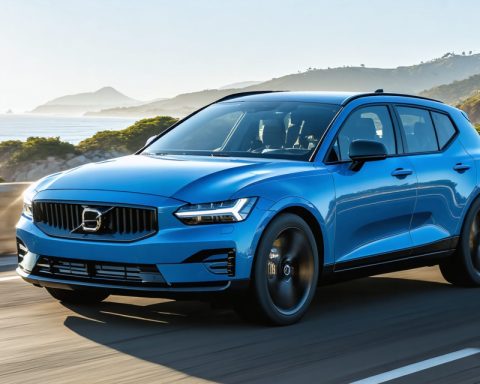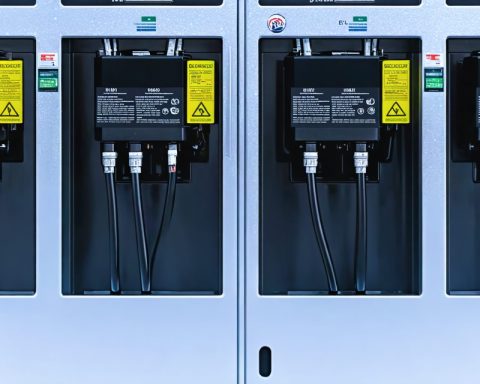- President Trump’s 25% tariff on foreign-made cars aims to ignite a global trade war, impacting automakers worldwide.
- Tesla, despite its U.S. manufacturing, is affected due to reliance on international parts, with 30-40% of components imported.
- Analysts suggest Tesla might fare better than competitors like Ford and Hyundai, who depend on foreign assembly.
- Consumer backlash and political issues are contributing to Tesla’s projected 14% sales decline in the U.S. and a 45% drop in stock value.
- European automaker shares also fell, with officials criticizing the tariffs and hinting at potential retaliatory measures.
- Retaliation could increase Tesla prices globally, affecting key markets like China and Canada.
- The situation underscores the complexity and interdependence of international commerce, with no company insulated from global trade dynamics.
At the core of the latest political maelstrom stands a bold pronouncement from President Trump: a hefty 25% tariff on foreign-made cars, aimed at igniting a trade war sure to ripple across the globe. The announcement has redefined the landscape for automakers worldwide, and as the clock ticks closer to April, the auto industry braces for impact.
Tesla, the avant-garde automaker, directed by CEO Elon Musk, finds itself in the crosshairs. Musk, known for his bold tweets and electric ambitions, acknowledged that these tariffs cannot be dodged, even with Tesla’s domestic manufacturing prowess. With facilities churning out vehicles heavy with U.S. labor and parts, Tesla seemingly stood on solid ground. However, the hard truth remains that no car is entirely immune, as every vehicle contains vital components sourced from an intricate web of global suppliers.
30% to 40% of Tesla’s parts are international imports, entwining the automaker in this economic dance. Despite this, industry analysts suggest that Tesla may emerge relatively unscathed compared to competitors heavily reliant on foreign assembly. The Ford Mustang Mach-E, assembled in Mexico, and Hyundai’s South Korean-manufactured Ioniq 5 could face harsher consequences from these tariffs.
A growing consumer backlash has already dealt Tesla a harsh blow, with diminished U.S. sales projected to plummet by over 14% compared to the last quarter of 2024. Vandalism targeting dealerships and brand-centric protests voice discontent over Musk’s political entanglements. Europe, a crucial market, reports staggering sales declines across multiple countries, even as overall EV enthusiasm soars. Such shifts sent Tesla’s stock spiraling down, a striking 45% decline from its December apex.
Gazing into the near future, the specter of retaliatory tariffs looms. Europe’s resolve is clear; they will not concede without a counteraction. European automaker shares tumbled following the tariff announcement, indicating the palpable anxiety spreading through the industry. Officials like German Minister Robert Habeck and European Commission President Ursula von der Leyen have decried the protectionist move, foreshadowing tumultuous times ahead.
The crux of the matter lies in international relations, where retaliation could compound Tesla’s woes, driving prices upward in pivotal markets like China and Canada. A ripple in trade policy could cascade into a wave, rendering Teslas costlier and challenging their global footing.
In an era defined by globalization, the lesson resounds: No player stands isolated in the web of international commerce. Tesla, with its deep American roots, illustrates the complexity and interdependence of today’s market. As trade tensions simmer and consumers express dissent, stakeholders across industries await the unfolding narrative. Tesla’s navigation through these choppy waters may offer vital insights for businesses charting a course in politically charged economic seas.
How Trump’s Tariffs on Foreign Cars Are Reshaping the Auto Industry
Understanding the New Tariff Landscape
The announcement of a 25% tariff on foreign-made cars by President Trump is not just a political maneuver; it’s a game-changer for the global auto industry. This move is expected to impact the production, pricing, and consumption of automobiles worldwide. Here’s what this means for automakers and consumers alike:
The Impact on Tesla and Other Automakers
Tesla’s Challenges:
– Parts Imports: Tesla, although boasting a significant amount of domestic production, imports 30% to 40% of its parts. This reliance on international components puts Tesla at risk despite its U.S. manufacturing base.
– Sales Decline: With projected U.S. sales dropping by over 14%, Tesla is feeling the heat from both political entanglements and consumer backlash. Vandalism and protests have added to Tesla’s woes, affecting its brand perception.
Competitor Vulnerabilities:
– The Ford Mustang Mach-E, assembled in Mexico, and the South Korean-manufactured Hyundai Ioniq 5 might face increased costs due to the tariffs. These models are likely to see price hikes in the U.S. market, potentially reducing their competitiveness.
A Glimpse of the Automotive Market Future
Market Forecasts & Industry Trends:
– The tariff could lead to a re-evaluation of supply chains with manufacturers seeking to localize production to avoid high tariffs.
– Shift in Consumer Preferences: As prices rise, consumers might lean towards used cars or defer purchases, affecting overall automotive sales volume.
Retaliation and Global Trade Dynamics:
– Europe’s potential retaliatory measures could further complicate the market. The possibility of counter-tariffs may pressurize American companies operating in Europe, especially automakers with assembly lines outside the U.S.
Navigating the Tariff Turmoil: Predictions and Strategies
Expert Insights:
– Some analysts predict that automakers might absorb some of the tariff costs to maintain market share.
– Investing in R&D for tariff-resistant practices, such as developing more parts domestically, could be a viable strategy for companies like Tesla.
Life Hacks and Practical Tips:
– For Consumers: Be on the lookout for potential discounts on foreign-made cars as dealerships may try to clear inventory ahead of price increases.
– For Investors: Pay attention to stock movements in the automotive sector, as market volatility may present both risks and opportunities.
Actionable Recommendations
For Automakers:
– Evaluate and potentially restructure supply chains to mitigate exposure to tariffs.
– Consider strategic partnerships and joint ventures to share resources and technology advantages in local markets.
For Policymakers:
– Engage in diplomatic dialogue to ease tensions and find a balanced approach to trade issues, fostering a favorable environment for businesses.
Conclusion and Final Thoughts
Navigating the complexities of international trade in the automotive industry requires agility and foresight. Companies like Tesla are at the forefront, demonstrating the intricacies of operating in a globalized economy. Stakeholders should stay informed and prepare for shifts in market dynamics.
For further reading on the trade policies impacting the auto industry, you might visit trusted news and industry sources such as BBC News or New York Times. Keeping abreast of developments can provide invaluable context as this situation unfolds.












